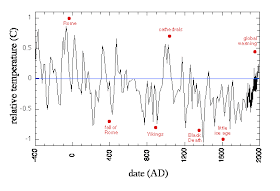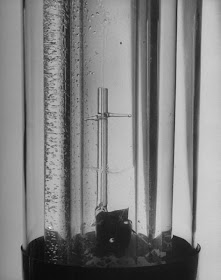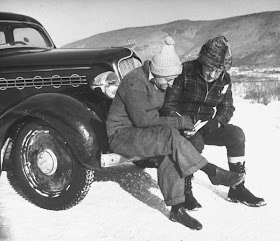
I was looking at someone's blog last week. I came across this picture of a large floral clock with its digits in Roman numerals. And it reminded me of something my fifth or sixth grade teacher once told me; the Romans did not have a symbol for zero. As the Wikipedia post suggests, dots and blank spaces might have been utilized.
But, "Records show that the ancient Greeks seemed unsure about the status of zero as a number. They asked themselves, 'How can nothing be something?', leading to philosophical and, by the Medieval period, religious arguments about the nature and existence of zero and the vacuum." Thus, knowing the difference between, say, 16 barrels and 106 barrels was a matter of context. (This rather reminds me of some ancient scriptures that used neither vowels nor spaces.) Here's another history of zero.
This is utterly fascinating to me! It was not merely the fact that the Arabs created Arabic numerals (0, 1, 2, 3, etc.); it's that they were "philosophically neutral" enough to give a null placeholder its due.
And some placeholder it's turned out to be. Add a couple zeroes to 1 to make it a hundred, another to make it a thousand, three more to make it a million. But then it gets complicated. There's disagreement throughout the world how many zeroes are needed to make a billion, trillion and so forth. That's probably why one is prone to see designations such as 10 to the 12th power rather than having it stated it as trillion (U.S.) or billion (much of the rest of the world). Check out this link and look for the "add zero" file, for a humorous take on this.

Once zero is given a value, the notion of negative numbers can evolve. In the winter, we use them all the time when discussing temperature, for instance. Unfortunately, there are two popular scales, Celsius (called Centigrade when I was growing up), used by most of the world, and Fahrenheit, in use primarily in the metric-resistant United States. Thus:
0 degrees Celsius is 32 degrees Fahrenheit.
0 degrees Fahrenheit is -17.78 degrees Celsius.
Cold and colder.
The scales are the same at -40; here's a temperature converter.
Then there is absolute zero, the point at which there is a "theoretical absence of all thermal energy." By definition, that is at 0 degrees on the Kelvin scale (−273.15 C, -459.67 F).
 Collins Helium Cryostat that freezes elements to absolute zero. September 1948
Collins Helium Cryostat that freezes elements to absolute zero. September 1948Once the concept of zero and negative number takes hold, then other concepts involving the word "zero" got introduced. Zero sum, for instance, suggests that some people are advantaged, and others disadvantaged in a transaction, and once you add up the pluses and the minuses, the sum is equal to zero. Or to quote John Mellencamp, "there's winners and there's losers." Compare this concept to win-win (or, I suppose, lose-lose.)
Zero hour refers to the end of the countdown to particular event, whether it be planned or unforeseen.
I'll end this with a song by Joan Armatrading, one of two "name" artists I've sactually seen twice (the other being the Temptations), doing Down to Zero.
 Jerome McLaughlin buying war bond from rural mailman Mark Whalon making rounds in sub-zero weather. East Dorset, VT, US; December 1942
Jerome McLaughlin buying war bond from rural mailman Mark Whalon making rounds in sub-zero weather. East Dorset, VT, US; December 1942ROG
Zero (and its "companion" infinity) are remarkable issues. The most "dangerous" subjects in the whole of mathematics.
ReplyDeleteWow, that almost gave me a headache reading about "nothing". Fascinating info. for the letter Z.
ReplyDeleteRoger, There's more to "zero" than I ever imagined. Thanks for introducing me to Joan Armatrading!
ReplyDeleteFascinating post, Roger, as always! Like the others I never realized that there was so much about nothing!! Terrific!
ReplyDeleteSylvia
Ah indeed there is a huge history to the concept of zero - all of it quite fascinating.
ReplyDeleteI was never good at Math, and I always got confused with the Roman Numbers.
ReplyDeleteAt my age, I don't want to know numbers, except I play SUDOKU.
Cheers,
Ann
P/s I and DHL some of Australia heat to you/
In the Netherlands six zeros gives you a million, nine zeros a milliard, twelve zeros a billion, fifteen zeros a billiard, eighteen zeros a trillion and twenty-one zeros a trilliard. Anything after that is (in my opinion) a bucket load!!
ReplyDeleteVery interesting post as always:-)
ReplyDeleteHave a great evening!
Excellent post. Of course, all math is nothing more than a human construct, but it's revolutionised how we think and learn.
ReplyDeleteYou are very interesting, Roger, and always manage to compile a variety of note worthy facts. Nice vintage photo also...
ReplyDeleteWow - what a fascinating post! I learned alot!
ReplyDeleteAnd I thought a post on zero wouldn't be too interesting - so I chose soemthing else! lol Was I ever wrong!
Loved the song. Haven't heard her in a while.
I learn a lot from your post about Z thanks for sharing!
ReplyDeleteZucchini
Only you could come up with such an interesting post about '0'! Great Z. Very good post.
ReplyDeleteMuch ado! Interesting piece but the piece de resistance is the final photo - the sale of a war bond. I love that photo!
ReplyDeleteFascinating post on zero!
ReplyDeleteBy Zeus, that is quite a zealous analysis of the numeral zero.
ReplyDeleteMuch ado about nothing, but a most interesting post. Love the closing song.
ReplyDeleteThat a whole lot of "nothing" you wrote about! HA! I agree...it's fascinating...fabulously academic post!
ReplyDeleteWhen I was a kid, I hated Math, but now I find it quite fascinating. I should copy this and take it to some of the teachers at my former school. Really interesting post!
ReplyDeleteI love this post! I never knew one could dig up so much background and history on zero! Thanks-this really appeals to the 'scientist' in me!
ReplyDeletesuch an informative take on Z!
ReplyDeletethank you
Thanks for this interesting post, Roger! I never realised that the Romans didn't regard zero as a number. I am used to algebra, where negative numbers are just as important as positive ones.
ReplyDeleteGreat explanation and an eye opener for me.
Have a nice day!
Lots of interesting information there. I've had the discussion with older son about whether zero is really a number, and he says not, which I found difficult to get my head around. Your calling it a 'placeholder' makes a lot of sense. ;)
ReplyDeleteI just read this morning that to fight against global warming the Farenheit users just have to switch over to Celius, lol !
ReplyDeleteWhat would we do without the number zero! There have been instances where people have had unexpected windfalls because a computer accidentally added a few zeros to their checks. And the reverse is true--people who have had exorbitant bills sent to them and had the headache of trying to straighten out all those extra zeros.
ReplyDeleteI always hope that when I mention the temperature on my blog that my UK readers convert it to C--there's quite a difference in zero degrees between the two!
Have never thought about that there is no figure for zero in the roman numerical, but you are right it starts with I.
ReplyDeleteAnd I have never thought of the complexibilty with zero either, often it just have been equal with none and obviously it isn´t that simple.
Thanks for stopping by.
Dead good! I never knew there was so much to say about zero, I wouldn't have thought that up in a zillion years!
ReplyDeleteNicely done!
Who'd have thought a number could be so interesting? Thanks for this fascinating post on 'nothing' :)
ReplyDeletegreat post! i am learning a lot. i gotta read it again =)
ReplyDeletethank you so much for the visit! till next Wednesday!
My father was a mathematician, and I remember often listening to him talking about the concept of zero. Thanks for the memory.
ReplyDeleteLoved reading this post, wonderful!
ReplyDeleteHere in my city we also have a floral clock like the one you describe, it's huge, just in front of the main University. Everybody living here has at least one photo taken in front of it, LOL!
Kisses from Nydia.